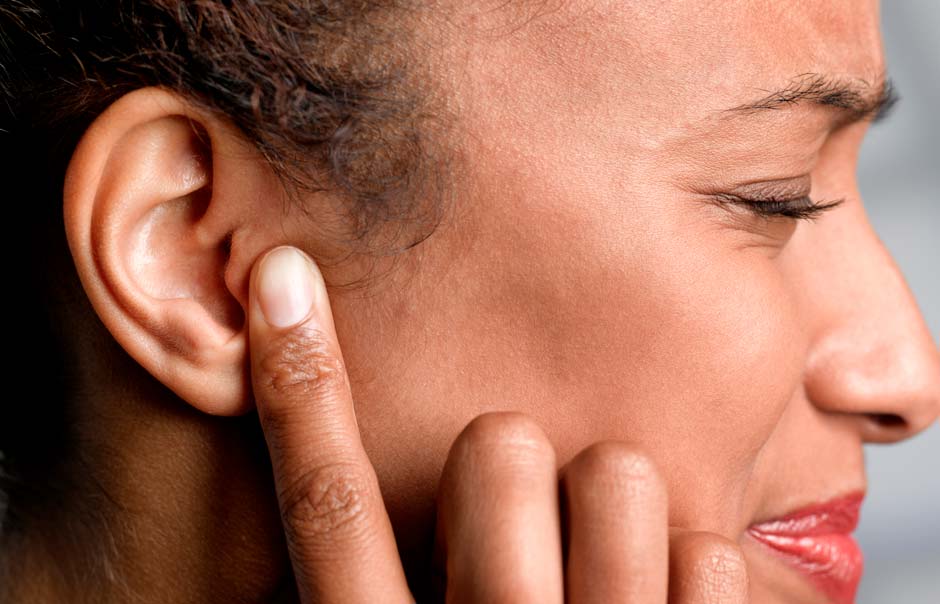If your head is constantly filled with sounds like ringing, whistling, clicking and roaring, it can interfere with your life. The distraction and annoyance brought on by a condition known as tinnitus can be frustrating and, in some cases, debilitating.
The ear, nose and throat (ENT) specialists at The Ohio State University Wexner Medical Center can help you. We have various treatments available that can relieve your symptoms of tinnitus. There are also several neurotologists on staff who specialize in tinnitus, so you’ll be in good hands as we walk you through treatment for this condition.
Additionally, the Department of Otolaryngology – Head and Neck Surgery is ranked as one of the best ENT programs in the country by U.S. News & World Report. Many doctors in Columbus, Ohio, and the region refer their patients to us for help with persistent issues related to hearing, like tinnitus.

What is tinnitus?
Tinnitus is often described as a ringing or buzzing noise present in one or both ears. This sound can also resemble roaring, clicking or hissing, and it may come and go or be relatively constant.
The condition is very common, affecting millions of people in the United States. Those with tinnitus may have trouble hearing, working or even sleeping.
What causes tinnitus?
Tinnitus can be caused by various internal or external factors ranging from attending a loud concert to the presence of a tumor. Oftentimes, it’s a symptom of another condition. It is often due to underlying hearing loss in one or both ears.
Causes of tinnitus can include:
- Allergies
- Anemia
- Certain medications, such as antibiotics
- Ear infections
- Eustachian tube issues
- Exposure to loud noises
- Foreign objects in the ear
- Hearing loss
- Heart and blood vessel problems
- Impacted earwax
- Hormonal changes in women
- Meniere’s disease
- Migraine
- Muscle spasms or abnormal activity
- Sinus infections
- Thyroid issues
- Tumors, like acoustic neuromas
Alcohol and caffeine usage, and the usage of other drugs — either prescribed pharmaceuticals or illegal drugs — can also cause noises to develop inside the ear.
Signs of tinnitus
Tinnitus is usually characterized by a phantom sound inside the ear that only you can hear. Sometimes, although rarely, it can be a sound that is audible. It may be a ringing, roar, hum, buzz or some other type of sound, and it’s often loud enough to interfere with your ability to hear or concentrate.
This can lead to other symptoms like:
- Difficulty hearing
- Dizziness or vertigo
- Depression or anxiety
With the signs of tinnitus present, it’s understandable you would seek answers and treatment. Although no one else can hear the sounds associated with tinnitus, there are several tests we can perform that can diagnose tinnitus or one of its underlying causes, like sinus infections or cardiovascular issues.
Tests include:
- Hearing exams to test for hearing loss
- Blood vessel studies (angiography)
- CT scan of the head
- Magnetic resonance imaging (MRI) of the head
Our audiologists will also review your use of prescription drugs, over-the-counter medications, and vitamins and supplements as these may be contributing factors to tinnitus.
Tinnitus treatment
It’s often possible to treat some of the underlying conditions that cause tinnitus, and the severity of the noises therefore lessens. There are a variety of intervention options available, and experts at the Ohio State Wexner Medical Center can help you choose what’s right for you.
Treatment for tinnitus will depend on the cause since tinnitus is often the symptom of another condition. Some treatments for tinnitus may include:
- A hearing aid-like device that can help mask tinnitus
- A hearing aid that increases the volume of wanted sound
- Communication counseling to help manage tinnitus
- Cognitive behavioral therapy

Ringing in your ears? Learn what causes tinnitus and how to manage it
Are your ears ringing? For millions of Americans, tinnitus, or ringing in the ears, is a chronic problem impacting daily life. Learn what causes tinnitus and how it can be managed.
Additional Information
How would you like to schedule?
Don’t have MyChart? Create an account
